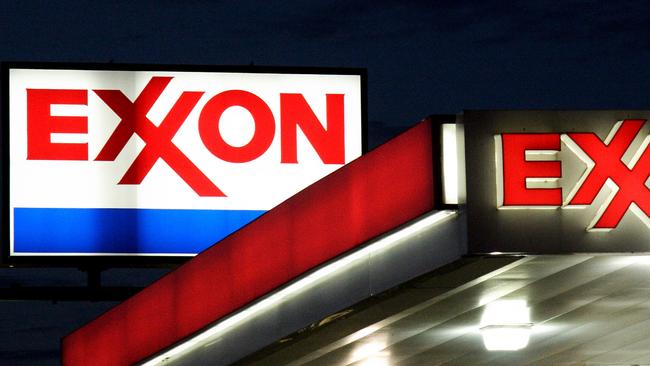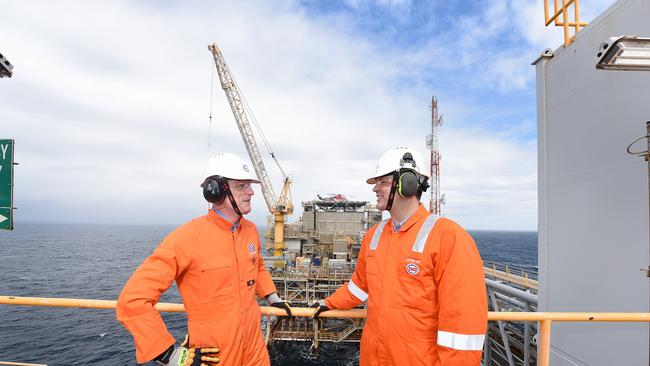ExxonMobil pays first tax in a decade as earnings soar
ExxonMobil’s Australian arm has returned a bumper annual profit and will resume paying corporate tax for the first time in nearly a decade due to booming commodity prices.

ExxonMobil’s Australian arm has returned a bumper annual profit despite slashing its workforce, declaring it will resume paying corporate tax for the first time in nearly a decade due to booming commodity prices.
The energy giant posted a $1.57bn profit after tax for the 2021 financial year after its earnings were hammered the year before from a massive Covid-19-induced crash in oil and gas markets which saw it scrape a slim $69m profit.
Its Australian revenue jumped 23 per cent to $12.1bn due to strong energy prices as the economy recovered from the pandemic, with income up from both its downstream refining operations and its stake in Chevron’s Gorgon LNG project in West Australia.
Exxon, which last year confirmed its Altona refinery in Melbourne will shut after nearly 75 years of operation, has cut a third of its staff in the last two years after warning of unprecedented market conditions following the oil rout that started in 2020.
The company has been among energy majors criticised for paying little or no corporate tax, given they have been able to claim deductions for exploration and major investments in Australia. However, Exxon said it now expected to return to paying corporate income tax in the 2022 financial year based on current commodity prices, after a near decade-long absence.
ExxonMobil Australia paid $3.1bn in federal government taxes in 2021, including $423m in Petroleum Resource Rent Tax.
“Following a period of significant demand destruction in 2020, ExxonMobil Australia’s result was mainly due to the improved oil and gas price environment in 2021 reflecting higher global demand for energy and increased sales volumes as the world emerged from the Covid-19 pandemic,” Exxon said in a statement after filing its annual accounts on Friday.
Oil prices rebounded last year as economies recovered from the pandemic while gas and LNG markets have roared to fresh records because of tight supplies.
ExxonMobil recorded a $179m writedown charge after a $555m impairment a year ago, linked to its Altona refinery, but also cashed in after selling its half-stake in the Scarborough gas field off the coast of Western Australia to Woodside Petroleum.

“ExxonMobil Australia received $416m in proceeds following the sale of its 50 per cent interest in Scarborough and incurred lower impairment charges by $500m following the conversion of Altona refinery into a modern fuel import terminal,” Exxon said.
Exxon remains one of eastern Australia’s biggest gas players, with Woodside its new partner in Victoria’s Bass Strait following the WA producer’s merger deal with existing partner BHP Petroleum.
Domestic gas prices on the east coast have remained high at near $10 a gigajoule, but local producers have been shielded by dramatic price surges on LNG markets caused in part by Russia’s invasion of Ukraine.
Exxon’s parent company in the US and Chevron delivered high first-quarter profits on Friday, with Exxon’s chief executive Darren Woods pointing to tight markets.
“The pandemic had a pretty profound effect with respect to deferring and delaying capital spend and, therefore, additional capacity coming on. And as the pandemic has subsided and demand has recovered, we‘re seeing very tight markets and seeing that play out really around the world with significant impact,” Mr Woods said.
“With Ukraine and the situation there, that has added a significant additional level of uncertainty around supply.”
Chevron, which operates Gorgon and Wheatstone LNG in WA, said it was nearly through maintenance at Wheatstone and predicted current tensions would keep LNG prices elevated over the near term.
“One of the lessons with history is just as the bad times don’t last forever, neither do the times when prices are strong, and so we can’t start to believe they’ll always be like this. But I think in the relative short term here, the tensions that you referred to are likely to remain,” Chevron chief executive Michael Wirth said.
Exxon in March pulled the trigger on a $400m investment in expanding gas development in the Gippsland Basin, in a move aimed at shoring up supplies for Australia’s southern states and plans to develop a major carbon capture and storage project offshore Victoria’s Gippsland Basin, the latest push by the oil and gas industry to boost its green credentials.




